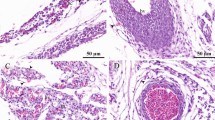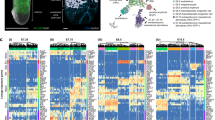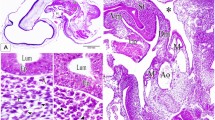Abstract
IN spite of the wealth of investigations carried out on the reticulo-endothelial system practically nothing has been reported on its activity and morphology in the embryo. Various workers have noted phagocytosis in early embryonic tissue, but there is divergence of opinion as to the extent and definition of the cells concerned. Recently, Kent1, using colloidal suspensions of ‘Thorotrast’ and of silver (silver-110), has made a valuable contribution to the knowledge of the appearance and phagocytic activity of macro-phage cells in the chick embryo, and it is to support this evidence further that the present findings are reported.
This is a preview of subscription content, access via your institution
Access options
Subscribe to this journal
Receive 51 print issues and online access
$199.00 per year
only $3.90 per issue
Buy this article
- Purchase on Springer Link
- Instant access to full article PDF
Prices may be subject to local taxes which are calculated during checkout
Similar content being viewed by others
References
Kent, R., J. Embryol. Exp. Morph., 9, 128 (1961).
Nicol, T., Bilbey, D. L. J., and Druce, C. G., Nature, 190, 418 (1961).
Nicol, T., Bilbey, D. L. J., and Ware, C. C., Nature, 182, 534 (1958).
Author information
Authors and Affiliations
Rights and permissions
About this article
Cite this article
NICOL, T., Cox, F., BILBEY, D. et al. Development of Reticulo-endothelial System in Avian Embryos. Nature 194, 105–106 (1962). https://doi.org/10.1038/194105a0
Issue Date:
DOI: https://doi.org/10.1038/194105a0
Comments
By submitting a comment you agree to abide by our Terms and Community Guidelines. If you find something abusive or that does not comply with our terms or guidelines please flag it as inappropriate.



